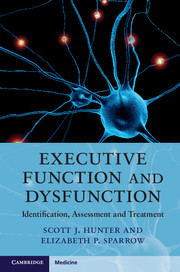Book contents
- Frontmatter
- Contents
- Editor biographies
- List of Contributors
- Preface
- Acknowledgments
- Introduction
- Section I Foundations of Executive Function/Dysfunction
- Section II Executive Dysfunction in the Neurodevelopmental and Acquired Disorders
- Section III Applications
- Appendix 1 Abbreviations used in the book
- Appendix 2 Tests/tasks referenced in the book
- Index
Preface
Published online by Cambridge University Press: 05 October 2012
- Frontmatter
- Contents
- Editor biographies
- List of Contributors
- Preface
- Acknowledgments
- Introduction
- Section I Foundations of Executive Function/Dysfunction
- Section II Executive Dysfunction in the Neurodevelopmental and Acquired Disorders
- Section III Applications
- Appendix 1 Abbreviations used in the book
- Appendix 2 Tests/tasks referenced in the book
- Index
Summary
Preface
Executive functioning (EF) is a complex construct with many facets, served by an intricate neurobiologic network that develops over the course of childhood, adolescence, and early adulthood. The behavioral manifestations of EF and executive dysfunction (EdF) go through periods of rapid growth during this same time. This book reviews the research literature on the development and neurobiology of EF. Conceptual assessment issues are discussed, with a focus on key elements of identifying EF/EdF in specific clinical conditions such as Disruptive Behavior Disorders (DBD), autism spectrum disorders (ASDs), learning disorders (LD), mood and anxiety disorders, seizure disorders, and human immunodeficiency virus (HIV), among others, including test performance, neuro-imaging, and clinical presentation. Several chapters are devoted to practical aspects of EdF, including research-based treatment strategies, educational implications, forensic cautions, and intervention resources.
The text is divided into three sections. Section I provides a foundation by reviewing models of EF, neuropsychological and neurobiological development, and key assessment considerations. Section II presents critical information on how EF deficits present in pediatric neurodevelopmental and acquired disorders. The book closes with a section addressing applications of the research, including remediation and educational implications of EF deficits, cautions for forensic neuropsychologists, and reflections on the volume as a whole.
This book is essential reading for medical, psychological, and educational professionals who work with children and adolescents in clinical and educational settings.
- Type
- Chapter
- Information
- Executive Function and DysfunctionIdentification, Assessment and Treatment, pp. xiPublisher: Cambridge University PressPrint publication year: 2012

